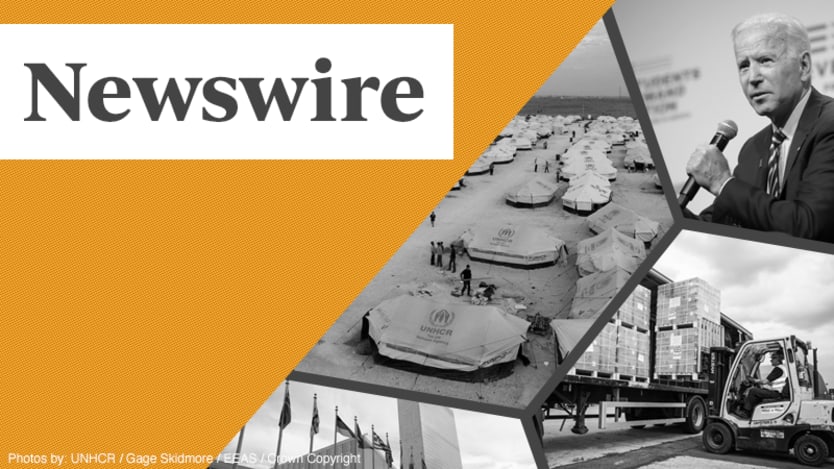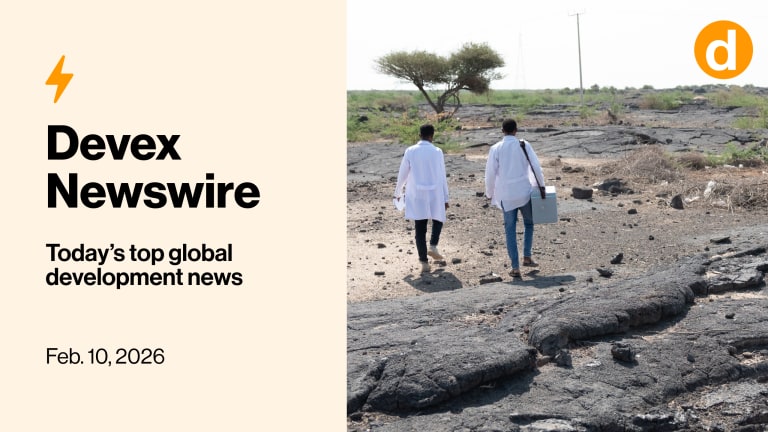Devex Newswire: USAID’s localization platform becomes a little clearer

The U.S. Agency for International Development released another pillar in its plan to work more and better with local groups this week. We look at how that’s been received.
Also in today’s edition: What a day in the life of an evaluation expert really like, and how to work for the United Nations.
The magnificent (if implemented properly) seven
This is a preview of Newswire
Sign up to this newsletter for an inside look at the biggest stories in global development, in your inbox daily.
One of the key development stories this year has been USAID’s attempt to better deliver on “localization,” as Administrator Samantha Power promised in a speech last November.
Now the agency has released a Local Capacity Strengthening Policy, my colleague David Ainsworth reports, with seven guiding principles for its work.
They are:
• Start with the local system.
• Strengthen diverse capacities through diverse approaches.
• Plan for and measure performance improvement in collaboration with local partners.
• Align capacity strengthening with local priorities.
• Appreciate and build on existing capacities.
• Be mindful of and mitigate the unintended consequences of our support for local capacity strengthening.
• Practice mutuality with local partners.
The reaction has been unusually enthusiastic for a government consultation. Experts were full of praise for the result, and for a thorough consultation — but …
“I'm actually having trouble translating the principles in this document for where they want to make real practical change,” says Jenny Russell, senior director of policy and advocacy at Save the Children. “Where do you want to be at the end of this administration? What is the practical change you want to see coming out of the policy? And I feel that is still a little bit foggy to me.”
Read: USAID rolls out 7 principles to strengthen local organizations (Pro)
+ Not yet a Devex Pro member? Read the piece and all of our coverage of USAID by starting your 15-day free trial of Devex Pro now.
All in
One organization that describes itself as “100% localized” is the U.S. African Development Foundation.
Over the last five years, the foundation has invested $120 million in African businesses, focusing especially on energy, agriculture, youth and female entrepreneurs.
With work touching 40 African countries, CEO Travis Adkins — who was sworn in in January — tells Devex’s Omar Mohammed that “all of our staff on the continent are African nationals of the countries in which they work.”
Employees’ local knowledge helps determine who to fund, and the foundation’s mandate is to put capital directly into businesses. “There's no use of U.S. based NGOs to funnel the money through,” Adkins says.
Funding is on the rise, including through a blended finance pilot underway with USAID to increase the maximum $250,000 that the foundation can currently provide.
And for Adkins, it’s a dream realized, creating “the kinds of partnerships on the continent that are rooted in respect for the agency of African people.”
Interview: The story behind the '100% localized' U.S. development agency (Pro)
+ Travis Adkins will be speaking at our Future of Development Finance conference in London on Oct. 25, alongside figures from British International Investment, the U.S. International Development Finance Corporation, and Open Society Foundations. Register here to attend in person or watch the livestream.
Problem area
In 2017, the Democratic Republic of Congo’s Ituri province was peaceful enough that the U.N.’s Congo peacekeeping mission planned to leave the area. But five years ago, a new wave of fighting started, causing many aid groups to suspend their work, even as 1.5 million people have been displaced.
Sam Mednick reports for Devex on the devastation felt by those left behind and the difficulties aid groups face as they try to restart work without a stable and negotiated peace — or donor funding that’s adequate to the needs of those on the ground.
Read: Violence soars in a corner of DRC that donors seem to have 'forgotten'
Friends with criticisms
A “critical friend.” That’s how Abhirup Bhunia sums up his job as an international monitoring, evaluation, and learning — or MEL — consultant.
He says MEL professionals “create an indirect impact by forcing everyone to think of impact when they design and implement programs, or even having stakeholders ponder about accountability since a lot of money is being funneled.”
But he’s got a caution too: “The need for evidence-based policy and decision-making has been acknowledged universally. However, just because there is consensus, it does not mean that a lot of the decisions taken are based on evidence.”
Read: Career advice from a monitoring, evaluation and learning expert
+ For more career advice, sign up for Devex Career Hub — a free, Friday newsletter that gives you global development’s top jobs and expert career advice.
Putting the you in the UN
Want to work for the U.N.? Chances are if you are reading this newsletter you’ve probably at least thought about it, right?
Today, Devex is hosting a digital event with Stephan Grieb, the deputy director of human resources for the UN Refugee Agency, and Skender Nushi, UNHCR’s chief of talent development and performance. We’ll ask what applicants need to know when pursuing a job with the agency and the U.N. in general.
The first in our series of events on working for the U.N. kicks off at 9 a.m. ET (3 p.m. CET). Sign up for a 15-day free trial of Devex Career Account to join the event.
In other news
The U.N. is debating the first of two resolutions that would impose sanctions on influential gang leader Jimmy Cherizier and other groups in Haiti deemed to be a threat to the country's peace and security. [WSJ]
While a deadly cholera outbreak is spreading in Lebanon, the World Health Organization has urged countries to only use one dosage of the cholera vaccine instead of two due to a supply deficit. [Al Jazeera]
An Oxfam report published Wednesday claims that high-income nations are failing to fulfill their climate finance commitments and are instead using loans that are burying low-income countries in debt. [Bloomberg]
Sign up to Newswire for an inside look at the biggest stories in global development.
Search for articles
Most Read
- 1
- 2
- 3
- 4
- 5








